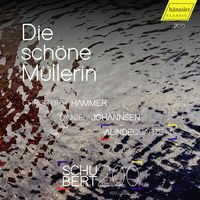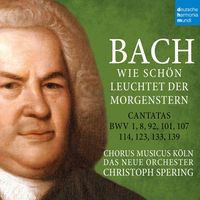Especially tenor Daniel Johannsen, whose sense of expression was so subtle and genuine that he would have to be one of the premiere oratorio singers in Europe.
David P. Stearns, The Philadelphia Inquirer, October 2016
Das Ensemble der Gesangsolisten wird vom derzeit wohl weltbesten Evangelistentenor, Daniel Johannsen, angeführt.
Peter Krause, concerti.de, April 2025
Sehr geehrte Damen und Herren, liebe Musikfreundinnen und -freunde, herzlich willkommen auf meiner Homepage!
Dear ladies and gentlemen, dear music lovers,
be very welcome to my website!
Gerne möchte ich Sie auf diesen Seiten an meinem abwechslungsreichen Leben teilhaben lassen, Ihnen zeigen, wofür mein Herz brennt und was mich beschäftigt.
Gehen Sie hier auf Entdeckungsreise, schmökern Sie in meinem Rezensionenarchiv, in den unterschiedlichen Fotoalben, in der Multimedia-Abteilung ― und hinterlassen Sie mir doch einen Kommentar in meinem Gästebuch!
Mit den besten Wünschen und herzlichen Grüßen ―
Here one these pages, I would like to let you participate in my varied life, to show you what thrills my heart and moves my mind.
Go on a voyage of discovery, browse my reviews archive, have a look at my various photo albums, visit the multimedia section ― and maybe leave a comment in my guest book!
Yours sincerely,
GROSSES DÉBUT / GREAT DEBUT:
JOHANNES in
Konzertmitschnitt von Deutschlandfunk Kultur vom 1. Juni 2025 aus der Berliner Philharmonie (Philharmonischer Chor Berlin, Brandenburgisches Staatsorchester Frankfurt, Leitung: Jörg-Peter Weigle)
Concert recording by Deutschlandfunk Kultur from 1 June 2025 from the Berlin Philharmonic Hall (Berlin Philharmonic Choir, Brandenburg State Orchestra Frankfurt, directed by Jörg-Peter Weigle)
MEINE NEUESTE SOLO-CD / MY LATEST SOLO ALBUM
»Welchen Rang diese Miniaturen haben, das läßt sich mittels dieser mehr als verdienstvollen CD nachvollziehen. Vorausgesetzt, man singt so stilbewußt, mit so schlankem, farbenreichem und immer eng am Text orientiertem Tenor wie Daniel Johannsen. Unterstützt wird er dabei von der ebenso subtilen Sopranistin Samantha Gaul und Pianist Klaus Simon. Sogar als Rezitator macht Johannsen bella figura: Wolff widmete sich dem damals populärem Genre des Melodrams, des von Musik untermalten Sprechstücks. So klingen Ehrenrettungen.« (Markus Thiel im »Münchner Merkur« vom 1. Juli 2024, wobei er für diese Aufnahme 5 von 5 Sternen vergibt)
Hugo Wolf? Kennt man. Erich Jaques Wolff? Nie gehört... 14 Jahre später geboren, ebenso tragisch früh gestorben, sich ebenso heftig dem Lied verschrieben habend wie der Erstgenannte. Nein, Jakob Wolff (wie er ursprünglich hieß), diesem Jungen aus kleinstbürgerlicher jüdischer Familie, in Wien aufgewachsen, wurde definitiv nicht an der Wiege gesungen, daß er der Liedbegleiter seiner Epoche werden sollte ― aber der hochbegabte, neugierige Kerl hatte Glück: lebte er doch in einer musikalisch förmlich explodierenden Metropole, wo er sich alles »ablauschen« und beibringen konnte, um schließlich mit Richard-Strauss-Heroinen wie Marie Gutheil-Schoder in Europa und Übersee große Erfolge zu feiern; große Erfolge, die sich ganz besonders auch seinen wunderbaren Liedern verdankten. Wolff vertonte dieselben Fin-de-siècle-Poeten wie auch sein Jahrgangskollege Schönberg, wie seine Zeitgenossen Zemlinsky, Ansorge, Marx und Reger. Aber nach seinem Tod 1913 gerieten die (allesamt in Druck erschienenen!) Werke vermutlich bewußt in Vergessenheit: ein jüdischer Komponist hatte im deutschnationalen Kulturkampf keinen Platz, keine Chance. Klaus Simon, dieser vielfältig begabte, nimmermüde Musikmacher und -entdecker, hat sich glücklicherweise dieses empörenderweise vergessenen Tondichters angenommen und wird in den kommenden Jahre seine mehr als 160 Lieder bei Naxos klingend und bei der Wiener Universal Edition auch in Form einer Neuausgabe herausbringen. Ich bin selig, Teil dieses Vorhabens zu sein! Die CD, im größten Label der Welt erschienen, ist überall erhältlich und sogar auf YouTube frei zugänglich. Allein schon wegen der drei effektvollen Melodramen am Ende sollte man sie sich nicht entgehen lassen!
“I have admired Daniel Johannsen as a Bach singer. [...] Here he and Simon make a strong case for these songs. [...]
Most of these songs call for quiet and subdued singing, and Johannsen is superb at that. If his voice were not so utterly lovely the prevalence of quiet singing might get tiresome, but it doesn’t. Other songs, especially some later songs, call for more oomph; and he delivers it sufficiently. The sublime ‘Glückes genug’ (Op. 17:6) with its Brahmsian sound shows Johannsen at his best. [...]
Johannsen and Simon bring the program to a close with 3 melodramatic settings of anonymous texts with Johannsen as narrator. These songs came as a delightful surprise to me. I am grateful to Simon for his advocacy of them.” (Robert A. Moore, “American Record Guide”, July/August 2024, p. 117f.)
Hugo Wolf? One knows. Erich Jaques Wolff? Never heard of... Born 14 years later, died just as tragically early, committed to the song just as fiercely as the former. No, Jakob Wolff (as he was originally called), this boy from a lower-middle-class Jewish family who grew up in Vienna, was definitely not told at the cradle that he would become the song accompanist of his era ― but the highly gifted, curious guy was lucky, since he lived in a musically exploding metropolis, where he could be a “sneak listener” and learn practically everything; ultimately, he celebrated great success both in Europe and overseas alongside Richard Strauss heroines like Marie Gutheil-Schoder; success which occured particularly due to his wonderful songs. Wolff set to music the same fin-de-siècle poets as his also 1874 born colleague Schönberg, as well as his contemporaries Zemlinsky, Ansorge, Marx and Reger. But after his death in 1913, the works (all of which had appeared in print!) were probably deliberately forgotten: a Jewish composer had no place, no chance in the German national cultural struggle. Klaus Simon, this multi-talented, tireless music maker and explorer, has fortunately taken on this outrageously forgotten tone poet and will be releasing his more than 160 songs in the coming years with Naxos and also in the form of a new edition with the Vienna Universal Edition. I am blessed to be part of this endeavor! The CD, released by the world’s largest label, is available everywhere and is even freely accessible on YouTube. Don’t you miss it, especially those three gorgeous melodramas at the end!
NÄCHSTER AUFTRITT / NEXT PERFORMANCE
Joseph Haydn: »Die Schöpfung«, Hob. XXI:2 · Samstag, 18. Oktober 2025, 18.00 Uhr, Haydnsaal von Schloß Eszterházy, Eisenstadt → MEHR/MORE |
WEITERE CD-NEUERSCHEINUNGEN / OTHER NEW CD RELEASES
»Hier nun ist die Einspielung, an der sich alles noch Kommende wird messen lassen müssen. [...] Maximale Klangentfaltung bei scheinbar minimaler Anstrengung, des Weiteren exzeptionelle Prononcierung sowie lyrische Verhaltenheit bei Möglichkeiten zu dramatischer Attacke, schließlich die Fähigkeit zur Ausdeutung des Textsinns im musikalischen Fluß, sorgsam einstudiert und dennoch aus dem klingenden Moment heraus lebend. Oder kürzer: eine Idealbesetzung.«
(Rüdiger Heinze, Opernmagazin »ORPHEUS« Nr. 3/2024)
Seit mehr als einem Vierteljahrhundert beschäftige ich mich mit dem ersten Zyklus der Kunstliedgeschichte. Bis heute brachte ich diese 20 Wilhelm-Müller-Lieder, mit denen sich mein Herz vermutlich vollends dem Sängerberuf zuwandte (obwohl ich damals noch Kirchenmusiker war!), öfters dar als jeden einzelnen Bach-Evangelistenpart. Es müssen inzwischen an die 115 Aufführungen sein, in Jerusalem, Toronto, Verviers, München, Graz, Sarajewo, in der Kirche genau so wie im umgebauten Hamam, im Opernhaus gleichermaßen wie in Konzert- und Schloßsälen, und am allermeisten in privaten Salons und Wohnzimmern ― dort, wo dieser Zyklus am besten hingehört.
Weil so lange gewartet werden mußte (und weil ich mir selber Reifezeit dafür geben wollte), liegt Schuberts ewig junges, ewig schönes Meisterwerk rund um seinen 200. Geburtstag nun gleich in zwei Versionen vor: einmal im Original, wieder mit meinem langjährigen Duopartner Christoph Hammer am herrlichen Graf-Hammerflügel von 1826, der schon auf meiner Schubert-Débüt-CD »Lieder ohnegleichen« zu hören ist, einmal gemeinsam mit meinen lieben Freunden vom Alinde Quartett. Eine Weltpremière. Jenes Ensemble ließ sich nämlich vom US-amerikanischen und in London ansässigen Tenor und Komponisten Tom Randle die nach unserem Dafürhalten erste vollständige Version von D 795 für Streicher bearbeiten. Das Ergebnis beglückt uns alle enorm.Erhältlich ist die Doppel-CD im guten Fachhandel, online (z. B. bei JPC, auf allen relevanten Streaming-Plattformen und dank der Philanthropie des Digitalvertriebs sogar frei zugänglich auf YouTube.
“Here is the recording by which everything to come will have to be measured. [...] Maximum development of sound with seemingly minimal effort, furthermore exceptional pronunciation and lyrical restraint when there are opportunities for a dramatic attack, and finally the ability to interpret the meaning of the text in the musical flow, carefully rehearsed and yet living from the sounding moment. Or in short: an ideal cast.” (Rüdiger Heinze, “ORPHEUS” opera magazine, no. 3/2024)
For more than a quarter of a century I have been working on the first cycle of art song history. To this day I have performed these 20 Wilhelm Müller songs, with which my heart probably turned completely to the singing profession (even though I was still a church musician at the time!), more often than any individual Bach evangelist. Upto now, there must now be around 115 performances, in Jerusalem, Toronto, Verviers, Munich, Graz, Sarajevo, in the church as well as in the “adapted” hammam, in the opera house as well as in concert and palace halls, and most of all in private salons and living rooms ― where this cycle fits best.
Because you had to wait so long (and because I wanted to give myself time to mature), Schubert’s eternally young, eternally beautiful masterpiece is now available in two versions on the occasion of its 200th birthday: once in the original, again with my long-time duo partner Christoph Hammer on the wonderful Graf fortepiano from 1826, which can already be heard on my Schubert debut CD “Lieder ohnegleichen” (“Songs without equal”), once together with my dear friends from the Alinde Quartett. A world premiere. That ensemble commissioned the US-American and London-based tenor and composer Tom Randle with the arrangement of what we believe to be the first complete version of D 795 for strings. The result makes us all extremely happy.
The double-disc is available in good specialist retailers, online (e.g. at JPC), on all relevant streaming platforms and, thanks to the philanthropy of digital distribution, even freely accessible on YouTube.
»Der Kölner Dirigent Christoph Spering läßt sich Zeit für sein Projekt der Gesamtaufnahme aller Bach-Kantaten. Und das ist gut so, denn auch die nun erschienene 3-CD-Box mit insgesamt neun Kantaten aus Bachs zweitem Kantatenjahrgang weist die Qualitäten aus, die auch schon seine vorher erschienenen Aufnahmen ausgezeichnet haben. Dazu zählen, neben der Fertigkeiten seiner Ensembles ›Das Neue Orchester‹ und des ›Chorus Musicus Köln‹, ein gutes Händchen bei der Auswahl der Vokalsolisten wie eine auffällig undogmatische Art im Umgang mit historischer Aufführungspraxis. Spering paßt Parameter wie Tempo und Besetzung dem Ausdrucksgehalt der einzelnen Kantaten an, wobei er gerade in der Continuobegleitung mehr differenziert als üblich. Da wirkt nichts forciert, die Musik fließt in entspanntem Duktus, und auch klanglich ist diese Aufnahme aus dem Kammermusiksaal des Deutschlandfunks exzellent gelungen.« Das schreibt Frank Armbruster in seiner Rezension auf concerti.de ― und dem ist eigentlich nichts hinzuzufügen; umgeben von wunderbaren Kolleginnen und Kollegen singe ich hier mithin die schönsten Arien, die Bach für den Tenor schrieb. Pfarrerssohn Spering und Pfarrerssohn Johannsen verstehen sich diesbezüglich ausgezeichnet. Erhältlich ist die reichhaltige Box u. a. auf JPC und überall, wo es gute Streams gibt.
“Cologne conductor Christoph Spering is taking his time with his project to record all of Bach's cantatas. And that’s a good thing, because the recently released 3-CD box set with a total of nine cantatas from Bach’s second cantata year also demonstrates the qualities that have distinguished his previously released recordings. These include, in addition to the skills of his ensembles ‘Das Neue Orchester’ and the ‘Chorus Musicus Köln’, a keen eye for selecting vocal soloists and a strikingly undogmatic approach to historical performance practice. Spering adapts parameters such as tempo and instrumentation to the expressive content of the individual cantatas, demonstrating greater differentiation than usual, especially in the continuo accompaniment. Nothing seems forced; the music flows in a relaxed style, and the sound of this recording from the Deutschlandfunk Chamber Music Hall is also excellent.” Frank Armbruster wrote this in his review on concerti.de ― and there’s really nothing to add. Surrounded by wonderful colleagues, I’m singing the most beautiful arias Bach wrote for the tenor. Vicar’s son Spering and vicar’s son Johannsen merrily join forces here. This comprehensive box set is available from JPC and everywhere else where good streaming is available.
Nikolaus Matthes: »Markuspassion« (nach Picander / komplette Neukomposition in barockem Stil)
»Das ist doch von Bach – Matthes hat eine Markus-Passion komponiert, als stamme sie vom Meister persönlich; [...] frech, gut gemacht, vertraut klingend und hörenswert.« (Reinhard R. Brembeck in der »Süddeutschen Zeitung« vom 28./29. März 2024)
»Mit respektvoller Anlehnung an Bachs Sprache [...] ein zutiefst ernsthaftes, uneitles Unternehmen [...], immer dem Geist und der Tradition barocker Passionsmusiken verpflichtet.« (Werner M. Grimmel in der »Frankfurter Allgemeinen Zeitung« vom 4./5. April 2024)
Selten in meinem Leben hab ich so viel Liebe und Akribie in einem Projekt von A bis Z stringent vereint erlebt: vom A der ersten Projektvorstellung im Coronajahr 2020 bis zum Z der nunmehr erfolgten CD-Veröffentlichung. Nikolaus Matthes, Jahrgang 1981 und mit vielem begabt (nicht nur in Komposition und Tonmeisterei extrem habil), ist halt Schweizer ― das sieht und spürt man dieser wohl edelsten und reichhaltigsten Publikation, auf der jemals mein Name prangte, auch sofort an. Nicht nur knüpft Matthes an alte tonsetzerische Traditionen an (der Schlußchor des ersten Teils ist für mich das schönste Chorstück seit Mendelssohn): ihm ist es etwa als Buchbinder auch wichtig, daß der Begleitband (von Booklet darf hier nicht die Rede sein!) allen Regeln der Druckkunst gerecht wird.
Über dieses einzigartige, großformatige Werk selbst will ich hier keine Worte verlieren: man kann ganz viel darüber auf einer eigenen Website nachlesen (und sollte das auch unbedingt tun). Die Freude, die wir bei der Uraufführung im März 2023 erlebten, ist beim Anhören dieser großartig geschnittenen Liveaufnahme jedenfalls allenthalben hör- und spürbar. Und wohl in keinem anderen Werk der Musikgeschichte führen zwei Evangelisten (Georg Poplutz und ich, quasi ein Yin-Yang-Dioskurenpaar) wie in einer eloquenten Doppelconference durch die Handlung.
Erhältlich im guten (Online-)Fachhandel (etwa auf JPC), auf allen Streaming-Plattformen und sogar als YouTube-Playlist (aber, wie gesagt, das physische Gesamtkunstwerk dieser Publikation ist ein absolutes MUSS!!!
Nikolaus Matthes: “St Mark Passion” (after Picander / thoroughly new composition in baroque style)
“The most intriguing new Passion recording this year [...], so baroque – but it was actually created in the last couple of years [...]. I found this surprisingly effective, especially in a performance as committed as this. [...] A brand new St. Mark Passion that often feels as old as Bach, but simultaneously fresh and vital.” (Andrew McGregor on BBC Radio 3, March 30, 2024)
“Clearly, Matthes has assimilated so much of what makes Bach so special and brilliant. He has obviously studied and been moved by his music and must have thought many times of how, if Bach had composed this Passion, he would have brought his genius to the work. Bach was the inspiration, no doubt about it, but he has dared to go much further than others in approaching such an ambitious enterprise and he’s brought it off splendidly. It’s his work, not Bach’s, and the more I hear of it, the more I delight in what he has achieved and been moved by it.” (Joel Flegler, Publisher of “Fanfare Magazine”, April 22, 2024)
Rarely in my life have I experienced so much love and meticulousness stringently combined in a project from A to Z: from the A of the first project presentation in the Corona year 2020 to the Z of the CD publication that has now taken place. Nikolaus Matthes, born in 1981 and gifted with many things (not just extremely skilled in composition and sound engineering), is Swiss after all ― you can immediately see and feel that in this probably most noble and generous publication on which my name has ever been emblazoned. Not only does Matthes build on old musical traditions (the final chorus of the first part is, for me, the most beautiful choral piece since Mendelssohn): being a bookbinder, it is also important to him that the accompanying volume (there is no talk of a booklet here!) follows all the rules of the old printing trade.
I don’t want to waste any words on this unique, large-format work itself: you can read a lot about it on its own website, and you definitely should, though it’s in German only (but translating web browsers like Chrome will help). The joy that we experienced at the world premiere in March 2023 can be heard and felt everywhere while listening to this superbly edited live recording. And in probably no other work in music history do two evangelists (Georg Poplutz and I, a yin-yang pair of Dioscuri) lead through the action like in an eloquent double conference.
Available from good (online) retailers (e.g. JPC), on all streaming platforms and even as a YouTube playlist (but, as I said, the physical artwork of this publication is an absolute MUST!!!)
Fotonachweise / Picture Credits
Alle nicht näher spezifizierten Fotos auf dieser Webseite wurden von Marcel Plavec aufgenommen.
All unspecified photos on this website were taken by Marcel Plavec.







